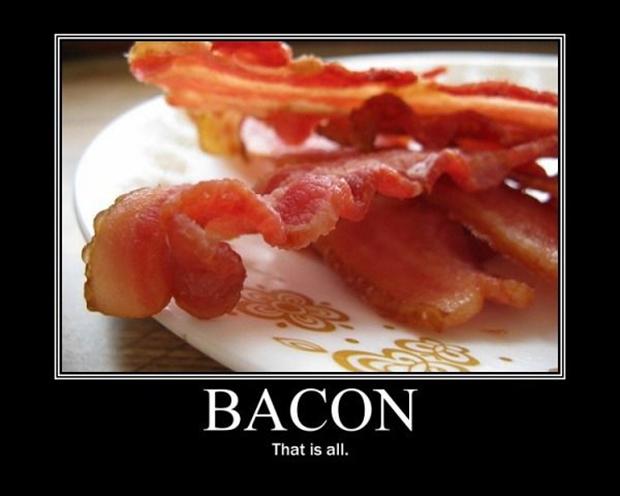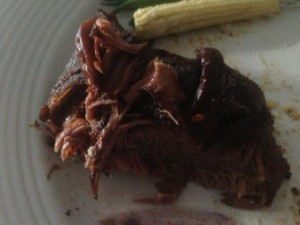As readers of this blog, there is something you should know about me: I love bacon. I love it by itself, I love it with eggs. I love it on a sandwich, and I love it wrapped around hors d’œuvres at March Madness parties (it is, in fact, the best part about any sports party).
This weekend my girlfriend made the most amazing bacon-cooked entree I’ve had in my whole life. Seriously, it was out of this world. Every bite melted in my mouth, and the combination of the bacon, garlic and chipotle peppers concocted a flavor that was phenomenal.
Being the complete nerd that I am, I couldn’t help but think about the relationship between bacon and my faith as a Christian. Which naturally led to me thinking about what it must’ve been like to be held in bondage under the law as the Jews once were (and many still are). From there I began to think about how many times in our current culture I’ve heard Christians being blasted as hypocrites for eating pork (and/or shellfish). After all, doesn’t the Bible say we can’t eat them? The common analogy I hear is that Christians treat the Bible as if it is trail-mix, picking and choosing the parts that we like or don’t like. We’ve all seen it right? The email-chains being forwarded around about all the commands in the Bible Christians don’t keep (especially those from Leviticus), the blasts on Facebook about how we’re hypocrites and Jesus just wants us to be nice to one another (is a half-truth still truth?).
Two things sadden me about this. The first is that our culture around us can read the scriptures and completely miss what the Bible is about. Truly, “the word of the cross is folly to those who are perishing” (1 Corinth. 1:18, ESV). Secondly, how Bible-illiterate is our church that we cannot quickly and easily respond to what our culture would like to think is often the “nail in our coffin”? Too many times have I seen Christians brought on talk shows only for this issue to come up, and they just have no response.
The irony is that the non-Christians who claim to hate religion, and are telling Christians we should be keeping the dietary laws, are understanding the Scriptures the same way the religious leaders did whom Jesus repeatedly said were wrong.
I titled this post “Bacon, Jesus, and the New Covenant”. Not only are these three of my favorite things, but they’re quite closely linked.
Bacon and the Old Covenant
It is true, the Bible twice explicitly forbids the eating of swine. Both Leviticus 11:7 and Deuteronomy 14:8 speak as such. “And the pig, because it parts the hoof but does not chew the cud, is unclean for you. Their flesh you shall not eat, and their carcasses you shall not touch” (Dt. 14:8, ESV). There are three reasons we can look at that would explain the reasoning for this law.
The first of these is that it was simply for hygiene reasons. This view would say that pork can be contaminated with worms and bacteria, so the prohibition might have been based on the fact that eating pork can lead to illness. Since this only occurs occasionally, and can happen from eating other meats, it is likely that this is not the best explanation.
The second explanation would say that the prohibition of swine has to do with the pig’s association with certain Babylonian, Syrian and Egyptian gods (ISBE). However, this theory does not explain why other animals were forbidden (Leviticus 11:4-6, Deuteronomy 14:7).
The third reason, and the most probable, would be the pigs symbolic representation. The International Standard Bible Encyclopedia (ISBE) says it this way:
“The standard sacrificial animals of the pastoralist Israelites were sheep, goats, and oxen, which all had in common cloven hooves and the fact that they chewed the cud (cf. Lev. 11:3). God had chosen certain animals for sacrifice in the same way that He had chosen one nation, Israel, to be His holy people. As God’s people Israel was to reflect His holiness (cf. vv 44f) by restricting its diet to those animals that fitted the pattern of the animals chosen by God for His “diet” (namely, cloven hooves and chewing the cud). The pig is “unclean” because it meets only half the requirements: it has cloven hooves but does not chew the cud (v 7).”
Up to this point, eating bacon-cooked ribs seems like a pretty serious offense doesn’t it? So why then is it not hypocritical for Christian’s to partake in this meal?
All Foods are Declared Clean
The problem with stopping at the end of our discussion above is it would not do the Scriptures justice as to what it says to the entirety of the “bacon-problem” (I don’t like to see these two words so closely associated). The coming of the Messiah, Jesus Christ, brought in a new age – and with him a new covenant (more on this later). So much of what Jesus spoke to when he came to live among us was the people who kept the old law religiously, yet didn’t understand the purpose of the laws at all. On the outside, many Jews appeared to be the most holy of peoples, but on the inside they were completely bankrupt. Jesus calls these people white-washed tombs – they look clean on the outside, but are full of everything unclean on the inside.
We see this flushed out in the Gospel of Mark, chapter 7. Jesus had just finished telling a parable to the Pharisees and Jews, and he finished his time with the people by telling them “Hear me, all of you, and understand: There is nothing outside a person that by going into him can defile him, but the things that come out of a person are what defile him” (Mark 7:14-15, ESV). Confused by his teachings, his disciples continue to question Jesus further. Jesus goes on to explain “Then are you also without understanding? Do you not see that whatever goes into a person from outside cannot defile him, since it enters not his heart but his stomach, and is expelled? (Thus he declared all foods clean.)” (Mark 7:18-19, ESV). You see, the point Jesus is trying to make is nothing we can physically do makes us clean in any way. The religious law-keepers at the time claimed that not eating pork made them cleaner than others. Jesus want’s to get at your heart and root out the wickedness that inhabits it – he isn’t concerned with what you eat. After all – as verse 19 says literally in the original Greek – what we eat goes into our stomach and then out into the latrine. Jesus wraps up his point by telling us the things that he is concerned with – what naturally dwell in our hearts: “For from within, out of the heart of man, come evil thoughts, sexual immorality, theft, murder, adultery, coveting, wickedness, deceit, sensuality, envy, slander, pride, foolishness. All these evil things come from within, and they defile a person.” (Mark 7:22-23).
This point is again hit on in the book of Acts. Peter has a vision from God – in it there is a white sheet, and on this sheet are all the animals, reptiles and birds of the air. Peter was then commanded to rise, kill and eat. Peter objected, saying that he has never touched a common or unclean animal. He is then instructed “What God has made clean, do not call common.” (Acts 10:15, ESV). Here again we see that there is something different now that Jesus has come – God’s followers are now allowed to eat all animals under creation (there is a deeper meaning behind this passage, concerning taking the gospel to the gentiles – but it is not relevant to this discussion).
Finally, in Paul’s letters to the Romans we actually see that it would be wrong for us to continue holding to dietary restrictions under the law. In chapter 14 the Apostle Paul tells us “One person believes he may eat anything, while the weak person eats only vegetables. Let not the one who eats despise the one who abstains, and let not the one who abstains pass judgment on the one who eats, for God has welcomed him…Everything is indeed clean..” (Romans 14: 2-3, 20a, ESV). For the Christian Paul says, we would actually stand weaker in our faith if we held to dietary restrictions.
It’s clear from a reading of the entirety of what the Scriptures have to say about pig that it is indeed lawful for a Christian to enjoy a bacon cheeseburger. Before, we alluded to the term “New Covenant”. None of what we have discussed so far would make any sense without the New Covenant, and it is only under the New Covenant that we come to understand the point Jesus is driving home.
The Beauty of the New Covenant
The Bible is full of what we call “covenants”, that is, a promise made between God and His people. We see multiple covenants in the Old Testament between God and the people of Israel. After the fall of man, the people of Israel are put into a law-abiding relationship with God. This is where we get the Ten Commandments, the dietary restrictions, the restrictions of the sabbath, and so on. If we read the Old Testament in it’s entirety we get a crazy cyclical picture of a chosen people of God who continually fall into grievous sin, God punishes them, the people cry out to God, he saves them from their predicament, he gives them more laws to abide by to keep them from falling back into sin, but then they just break the new commands and do it all over again. What we see from this picture is that no matter how hard we may try we always fail to live up to God’s standards. To account for this, the people of God routinely had to make sacrifices to atone for their sin. There were restrictions on this too – the animal was often a lamb, it had to be male, containing no blemishes – basically, a perfect lamb. To account for their sin, someone or something had to take their punishment. “Indeed, under the law almost everything is purified with blood, and without the shedding of blood there is no forgiveness of sins” (Hebrews 9:22, ESV).
Fast forward a couple thousand years. It’s first century Jerusalem, and for hundreds of years the chosen people of God have been religiously keeping their laws. The Pharisee’s of the time – the teachers who believed their righteousness came from how well they kept the law but were completely corrupt – held complete power over the Jewish people. Out of nowhere, a young man speaking with authority walks onto the scene telling them they’ve gotten it all wrong. Not only is he speaking with authority and calling out these teachers of the law, but he’s performing great miracles. He’s claiming the ability to forgive sins. Most importantly, he’s claiming to be God.
With him comes a new message: he is going to usher in the New Covenant. The law was given to us to reveal our sinful hearts – not to keep it like a checklist and then consider ourselves clean. When the law says do not murder, it is meant to show us the reality that the hatred in our hearts towards others is murder (Matthew 5, 1 John 3). Similarly, when we even so much as lust after others, we’ve already committed adultery (Matthew 5:28). God’s standards for us are so high that it is impossible for us to keep them. Under the New Covenant, Jesus fulfills the law-restrictions of the old (Matthew 5:17). Under the old law, we see the weight of our sin and how wretched we are. Culture wants to tell us that we’re all basically good, in reality we are all quite bad.
Until we see the weight of our sin under the old law, we will never see the glory, richness and beauty of life in Christ.
This is why the New Covenant is so amazing: while we were under bondage of the law, while we were sinners under it, Christ died for us. (Romans 5:8). The law brings death, but the Spirit of God through Christ brings life (2 Corinthians 3:6). Don’t you see? Christ is the perfect, spotless, blameless lamb! We are no longer captive to the law, sin and death because he took the punishment that we deserved once and for all. It’s the most magnificent thing that has ever happened in the entirety of time, and he did it for you and me.
***Side-note***
It would be wrong for us to conclude that we can therefore live a life not in pursuit of holiness. Yes, we are free from the bondage of law and the ceremonial commands that came with it, such as dietary restrictions and special days of observance. But the moral law – how we are to act in our relation to God and our relation to others – remains intact. We are no longer burdened with making ourselves right before God when we sin; Christ has done that for us. It is however still the obligation of every Christian to pursue a life of holiness, which we can only do through Christ and by the power of the Holy Spirit.
***End Side-note***
—–
Quite a bit of exposition from a plate of bacon-cooked ribs.
Christian, if you’re reading this, I hope this was a blessing to you. I hope this will help you not only articulate the Scriptures teachings to this common objection, but that it will also be a reminder of your sinfulness, and your captivity under the old law – and the grace you’ve found in Christ. Do not be like those white-washed tombs.
Non-Christian, I hope this was a blessing to you too! At the very least, it is my hope you learned something about the Christian faith you didn’t know before. Maybe it will be an exhortation to you to dig deeper into sin, grace and the beauty of what Christ did on the cross.
Questions, comments? Sound off below!


